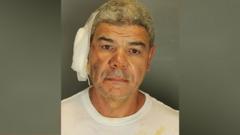Deportee Kilmar Ábrego García returned to the US to confront charges of human trafficking, after a complicated legal journey and accusations of wrongful deportation and governmental overreach.**
US Returns El Salvador Deportee for Federal Charges Amid Legal Controversy**

US Returns El Salvador Deportee for Federal Charges Amid Legal Controversy**
Kilmar Ábrego García is back in the US facing serious trafficking charges, prompting debate over his treatment and rights.**
In a significant legal development, Kilmar Ábrego García, a 29-year-old from El Salvador, has been repatriated to the United States to face prosecution on two serious federal criminal charges. Following his improper deportation in March, he is accused of being involved in a conspiracy to facilitate the transportation of undocumented migrants across the country, specifically from Texas to Maryland and beyond.
The return was finalized after El Salvador agreed to release him, prompted by an arrest warrant presented by U.S. officials, according to Attorney General Pam Bondi. García's attorney has deemed the charges against him "preposterous," insisting on his innocence and arguing that he never faced any prior convictions in relation to gang affiliations.
The reinstatement of his case follows a U.S. Supreme Court directive from April to ensure his return amid significant scrutiny from the public and lawmakers alike. An indictment revealed that García allegedly played a "significant role" in a human smuggling operation that transported thousands of illegal immigrants to the United States over several years. Additionally, the indictment includes allegations of him facilitating the movement of individuals connected to MS-13, a gang designated by the U.S. as a foreign terrorist organization.
At an arraignment hearing in Nashville on June 13, Judge Barbara Holmes will review whether there is sufficient reason to detain García while awaiting trial. For the moment, he is held in federal custody, a reality his legal representatives describe as an "abuse of power." They argue that García's separation from the U.S. was not just an error but a violation of his rights, with his lawyer asserting that he deserves a fair trial.
President Donald Trump characterized García as a "bad guy," expressing support for the decision to extradite him. His legal entanglements began when he entered the U.S. illegally as a teenager in search of safety, eventually leading to his arrest in Maryland during a crackdown on illegal immigration. Although an immigration judge previously barred his deportation due to fears of gang persecution in El Salvador, the climate shifted leading to his unexpected deportation earlier this year under wartime laws referencing the Alien Enemies Act.
After being taken to a notorious prison in El Salvador amidst a reactive administration, his case spiraled into a lengthy legal battle over his rights and treatment. Senator Chris Van Hollen's engagement highlighted the broader implications of the case, emphasizing constitutional rights over individual cases. El Salvador’s President Nayib Bukele, aligned with Trump, viewed the return request favorably, acknowledging the complexities of international legal collaboration in such matters.
Moving ahead, U.S. authorities are expected to argue for his detention pending trial, citing perceived threats to community safety and a risk of flight. As the case unfolds, the intersection of immigration enforcement and civil rights remains a contentious issue for many advocates observing the proceedings.
The return was finalized after El Salvador agreed to release him, prompted by an arrest warrant presented by U.S. officials, according to Attorney General Pam Bondi. García's attorney has deemed the charges against him "preposterous," insisting on his innocence and arguing that he never faced any prior convictions in relation to gang affiliations.
The reinstatement of his case follows a U.S. Supreme Court directive from April to ensure his return amid significant scrutiny from the public and lawmakers alike. An indictment revealed that García allegedly played a "significant role" in a human smuggling operation that transported thousands of illegal immigrants to the United States over several years. Additionally, the indictment includes allegations of him facilitating the movement of individuals connected to MS-13, a gang designated by the U.S. as a foreign terrorist organization.
At an arraignment hearing in Nashville on June 13, Judge Barbara Holmes will review whether there is sufficient reason to detain García while awaiting trial. For the moment, he is held in federal custody, a reality his legal representatives describe as an "abuse of power." They argue that García's separation from the U.S. was not just an error but a violation of his rights, with his lawyer asserting that he deserves a fair trial.
President Donald Trump characterized García as a "bad guy," expressing support for the decision to extradite him. His legal entanglements began when he entered the U.S. illegally as a teenager in search of safety, eventually leading to his arrest in Maryland during a crackdown on illegal immigration. Although an immigration judge previously barred his deportation due to fears of gang persecution in El Salvador, the climate shifted leading to his unexpected deportation earlier this year under wartime laws referencing the Alien Enemies Act.
After being taken to a notorious prison in El Salvador amidst a reactive administration, his case spiraled into a lengthy legal battle over his rights and treatment. Senator Chris Van Hollen's engagement highlighted the broader implications of the case, emphasizing constitutional rights over individual cases. El Salvador’s President Nayib Bukele, aligned with Trump, viewed the return request favorably, acknowledging the complexities of international legal collaboration in such matters.
Moving ahead, U.S. authorities are expected to argue for his detention pending trial, citing perceived threats to community safety and a risk of flight. As the case unfolds, the intersection of immigration enforcement and civil rights remains a contentious issue for many advocates observing the proceedings.






















